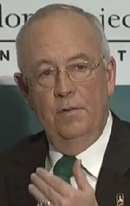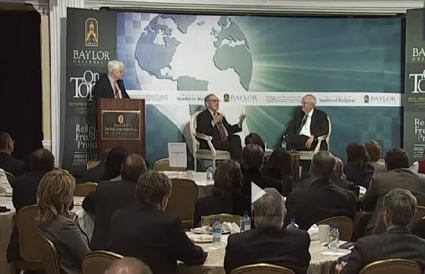Baylor president weighs in on Hobby Lobby case
WASHINGTON—One day before the Supreme Court heard oral arguments in what may result in its most significant religious liberty ruling this term, Baylor University President Ken Starr joined a noted Harvard law professor at a high-profile Washington forum to unpack the complex legal issues.
 Ken StarrStarr, a former U.S. Solicitor General and president of Baylor since 2010, and Alan Dershowitz of Harvard Law School focused on the Hobby Lobby case, one of two in which the high court must decide if employers with religious objections may refuse to provide their workers with insurance coverage for contraceptives as mandated in the Affordable Care Act.
Ken StarrStarr, a former U.S. Solicitor General and president of Baylor since 2010, and Alan Dershowitz of Harvard Law School focused on the Hobby Lobby case, one of two in which the high court must decide if employers with religious objections may refuse to provide their workers with insurance coverage for contraceptives as mandated in the Affordable Care Act.
The forum March 24 was part of an all-day conference touted as the inaugural event in a new religious liberty partnership between the historically Baptist university in Waco and Washington-based Georgetown University, the nation’s oldest Catholic institution of higher education. Co-sponsors of the conference included Baylor’s Institute for Studies of Religion and the Religious Freedom Project of Georgetown’s Berkley Center for Religion, Peace and World Affairs.
The public affairs cable network C-SPAN televised the conference held at the Willard Hotel, two blocks from the White House.
Religious rights for corporations
The Hobby Lobby case—brought by the Baptist owners of an Oklahoma-based arts-and-crafts chain they say is run on biblical principles—raises a question never confronted by the Supreme Court: Are secular,  Alan Dershowitzfor-profit corporations exempted from complying with a law if it conflicts with the owners’ religious beliefs?
Alan Dershowitzfor-profit corporations exempted from complying with a law if it conflicts with the owners’ religious beliefs?
The Green family, which owns the 640-store chain, believes some contraceptives and intrauterine devices may result in the destruction of human embryos—at odds with their religiously based pro-life views.
Also at stake is the constitutionality of the Religious Freedom Restoration Act, overwhelmingly approved by Congress in 1993, which aims to prevent laws that substantially burden a person’s free exercise of religion.
Starr and Dershowitz—a self-described skeptic who said he disagrees with the Greens’ view of birth control—largely dismissed the government’s argument that constitutional guarantees of free exercise of religion apply only to individuals and not to for-profit corporations.
“The oddity of this entire argument on the part of the government that because (Hobby Lobby) is a for-profit corporation, and that if they had remained as five (family) partners, they would have had full protection,” Starr said. “At what moment did that magic occur, that you had religious liberty rights and now you don’t?”
‘Prospects bright for Hobby Lobby’
“I think the prospects are bright for Hobby Lobby and are dim for the government …,” he added. “The argument made that Hobby Lobby lost its rights when they marched downtown in Oklahoma City and filed articles of incorporation with the secretary of state borders, in my judgment, on the frivolous.”
 The half-day conference in Washington, D. C., announced a new partnership between Georgetown University’s Religious Freedom Project and Baylor University’s Institute for Studies of Religion, the co-sponsor of the event. “I find that to be an absurd argument being made by the government,” agreed Dershowitz. “I thought the government’s brief on that issue was trivial and silly. … You are the corporation, and the corporation is you. That’s a religious principle, and it seems to me that if the court were in any way to try to undercut that religious principle by citing state law about what a corporation is … they would be falling into the trap of themselves violating the free expression of religion clause.”
The half-day conference in Washington, D. C., announced a new partnership between Georgetown University’s Religious Freedom Project and Baylor University’s Institute for Studies of Religion, the co-sponsor of the event. “I find that to be an absurd argument being made by the government,” agreed Dershowitz. “I thought the government’s brief on that issue was trivial and silly. … You are the corporation, and the corporation is you. That’s a religious principle, and it seems to me that if the court were in any way to try to undercut that religious principle by citing state law about what a corporation is … they would be falling into the trap of themselves violating the free expression of religion clause.”
But they disagreed on what might constitute an “unfair burden” under the provisions of the Religious Freedom Restoration Act. RFRA asserts religious exercise can be restricted only if there is a “compelling government interest” and if that interest is pursued in the least restrictive way.
“Every American who loves freedom should be applauding the statute that is at issue tomorrow in the Hobby Lobby case—the Religious Freedom Restoration Act,” Starr said.
The law provides a framework for protecting religious expressions, in part by permitting exemptions on the basis of strongly held religious beliefs, he said.
While Dershowtiz said he endorsed the RFRA standard, “when it comes to issues like whether or not a … family-owned corporation should be allowed to be exempted from providing a service that perhaps many employees would benefit from, that’s a much more complicated and difficult question.”
Key is finding middle ground
The key is to find a middle ground, he said, to launch a “search for accommodation at every stage.”
“We have to try to figure out a way of not requiring you to compromise at all with your religious views, but also make sure it doesn’t hurt those whose religious views are different from yours.”
In the Hobby Lobby case, he said, it was important to ensure the company’s employees were not disadvantaged by the exercise of the owners’ religious beliefs.
Starr responded government already provides numerous exemptions to legal requirements.
“There are mechanisms to achieve this balance of accommodation you’re talking about. … The government has a huge Achilles’ heel (in making its case) … in that there are exemptions galore.”
Deciphering the legal aspects of the Hobby Lobby case dominated the conversation, but perceptions of hostility to religion in American life that are driving some public debate about the case inevitably slipped in.
“There is a growing sense that if you are a person of deep religious faith, you’re in the crosshairs now,” Starr said. “There are people here from different religious communities who feel genuinely embattled in terms of freedom of conscience. … Has the culture shifted?”
If so, the fault lies with religious believers, Dershowitz said.
“You haven’t done a good enough job in the marketplace of ideas to persuade Americans of your point of view. I agree with you. I think you’re losing the battle among young people.”
Religion needs to ‘do a better job’
Don’t ask for the help of government to bolster religion, he said. “Do a better job. Go out there and make religion more relevant in the life of young people. You have to figure out—and it’s your job—a way of making people love what you believe in and love what you’re doing.”
Members of the Green family, in Washington for their case’s oral arguments, participated in the event. The family is using its considerable resources to build a Museum of the Bible near the capital’s National Mall to display a collection of more than 55,000 biblical artifacts.
The Greens also have been financial supporters of Baylor, making significant contributions to the university’s Institute for Studies of Religion and funding the Green Scholars Initiative, for which Baylor is a major research partner.